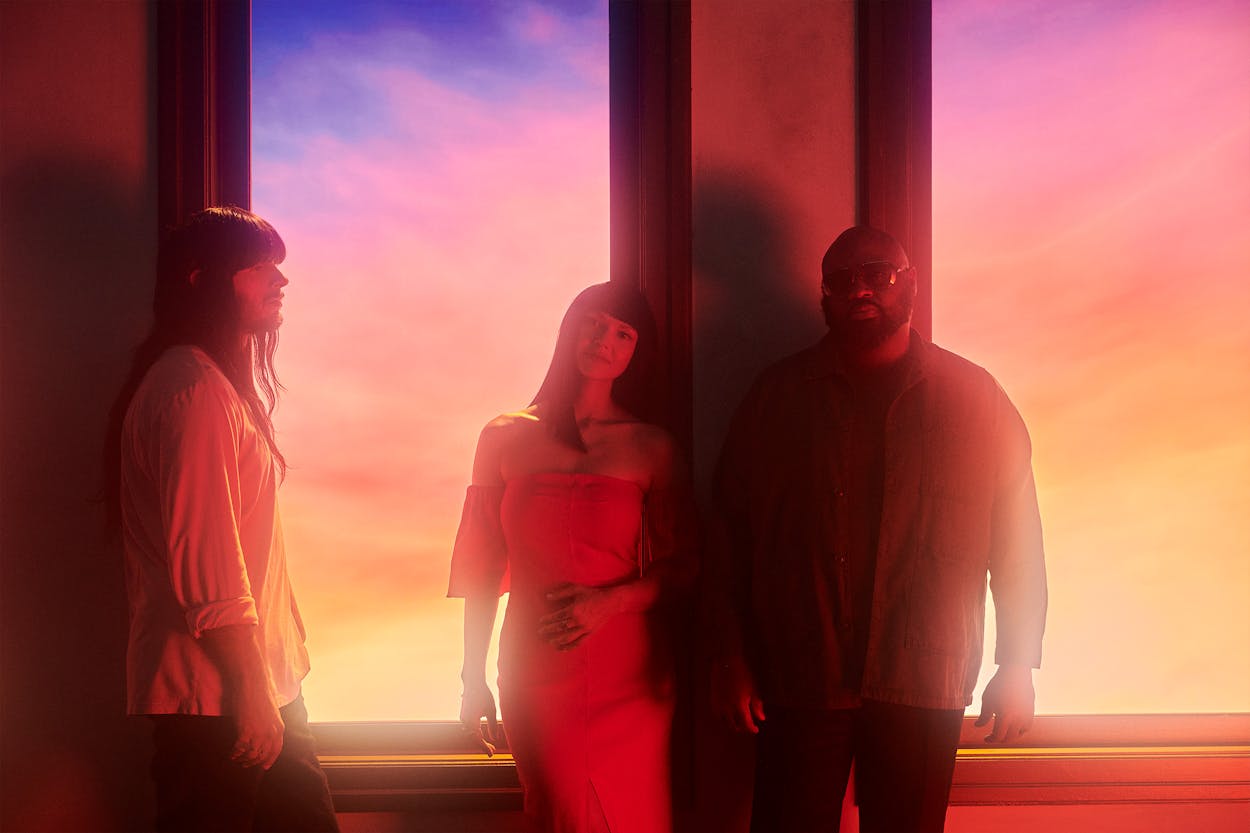There are infinite ways to decorate a room. Cover the walls with photos of your loved ones. Stack your precious literature into columns. Litter the shelves with mementos you’ve collected while traveling. Make it kitschy, dress it cute, or keep it formal; it’s yours to do with how you please. It takes confidence to ensure your room remains just yours, a haven despite a world beyond its walls. Which is why it feels vulnerable to open your door and let others inside. Khruangbin, Houston’s psychedelic soul-rock trio, unhinges the doors to their room entirely. With their fourth studio album, A La Sala, the band welcomes the world “to the room,” as the title translates from Spanish. It’s a space adorned with decorations as globally inspired as they are intimate.
For Khruangbin’s members—bassist Laura Lee Ochoa, drummer Donald “DJ” Johnson Jr., and guitarist Mark “Marko” Speer—the process of creating this album was about remembering where they came from, Ochoa said in the album’s press materials. “There was this need we collectively felt to get back to square one,” Johnson told SPIN. “We wanted to lean more into ourselves.” This meant returning to some trademark traditions, such as instrumental-forward music (when there are lyrics in A La Sala, they are sparse and distant), and departing from others. A La Sala is Khruangbin’s first album away from the unplugged barn in the small town of Burton, just west of Houston, where the trio recorded all their previous solo projects. Instead, the band reconvened in H-town (Johnson never left, but Ochoa and Speer live in Brooklyn and outside San Francisco, respectively), setting up shop in producer Steve Christensen’s downtown studio.
A La Sala is a product of that return home. You don’t have to listen much further than the first single, “A Love International,” to hear evidence of the trio’s signature coalescence: Johnson’s atmospheric drumming meets Speer’s hypnotic electric guitar riffs and Ochoa’s ever-funky bass in a breezy summertime tune. “A Love International” speaks to the album’s story of gathering, love, and longing, while showing off all the renovations that the band underwent in the four years since releasing their last solo album, Mordechai, in 2020. Since then, Khruangbin has collected many a musical memento to decorate the shelves. They joined forces with fellow Texan Leon Bridges in 2020 and 2022 to create two EPs—Texas Sun and Texas Moon—that blended country, soul, and R&B. In 2022, they also partnered with Malian artist Vieux Farka Touré to create Ali, a tribute to Touré’s father Ali Farka Touré, a renowned musician with pioneering influence spanning from West Africa to North America. Khruangbin brings these global influences along to build A La Sala. Walk into the room and find funky flooring, a ceiling of groovy blues, and smooth rock cascading across the walls, with stylings derived from Thailand, West Africa, the Americas, and the Middle East.
Despite the assemblage of influences, the album is never cluttered. Khruangbin is keenly aware of the virtue of simplicity—at some points, to a fault, as in low-energy tracks “Farolim de Felgueiras” and “Caja de la Sala.” The simplicity is at its best in the second single, “May Ninth,” a minimalist, dreamy standout track. The subtle instrumentation elicits pangs of deep longing, and the calming vocals (“just another day / oh, what it could be”) are cut through with warm optimism.
Whispery vocals, similar to those in “May Ninth,” echo with a quicker pace on “Hold Me Up (Thank You).” With a faster groove, particularly catchy guitar riffs, and strong bass lines, this song and the two that precede it (“Todavía Viva” and “Juegos y Nubes”) are some of the most playful on the album, even more so when “Hold Me Up (Thank You)” is paired with its music video of a globe-trotting and very thankful chinchilla. The latter calls on listeners to take time to check in on each other and give thanks to the people in our lives (“ooh, they got your number / ooh / ooh / any day / thank your friend, thank your lover”), a message that might lean overly saccharine when repeated over three-plus minutes. Luckily, the vocals take a backseat to the beat, functioning more as another texture for instrumentation rather than a monotonous chorus. The song’s explicit reminder to gather and be grateful for one another, while cliché, remains a relevant message in the context of our border-happy world.
Two tracks, “Ada Jean” and “Pon Pón,” exemplify the trio’s dynamism while reminiscing on sounds that the band explored with Bridges and Touré, respectively—American Western, West African, and Malian. “Pon Pón” picks up the tempo with allusions to West African funk and lyrics derived from la pirinola (or toma todo, a traditional Mexican game of chance played with a six-sided spinning top). By the end of the song, the whispery vocals return, counting to sixteen, twelve, and then eight in various languages, including Arabic, Chinese, Igbo, Korean, Spanish, Yoruba, and more. (Some might call these Duolingo lyrics the low-hanging fruit of international influences.) Khruangbin finds a way to expand its solo repertoire even further with “Ada Jean” and “Pon Pón”—notably through the hauntingly beautiful spaghetti Western soundscapes in “Ada Jean”—while simultaneously staying true to the band’s original ethos. Khruangbin—which roughly means “airplane” in Thai—need not paint with just one brush of influence, much like the multicultural city of Houston they emulate. The trio’s repository of inspiration draws no borders. Crafting an album, much like decorating a room, becomes far more exciting when you are well traveled.
- More About:
- Music






